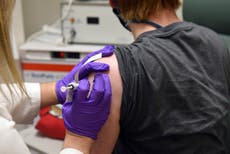Coronavirus vaccine: Pfizer given protection from legal action by UK government
Pfizer’s UK boss refuses to explain why the business needs protection from legal action
Your support helps us to tell the story
From reproductive rights to climate change to Big Tech, The Independent is on the ground when the story is developing. Whether it's investigating the financials of Elon Musk's pro-Trump PAC or producing our latest documentary, 'The A Word', which shines a light on the American women fighting for reproductive rights, we know how important it is to parse out the facts from the messaging.
At such a critical moment in US history, we need reporters on the ground. Your donation allows us to keep sending journalists to speak to both sides of the story.
The Independent is trusted by Americans across the entire political spectrum. And unlike many other quality news outlets, we choose not to lock Americans out of our reporting and analysis with paywalls. We believe quality journalism should be available to everyone, paid for by those who can afford it.
Your support makes all the difference.The UK government has granted pharmaceutical giant Pfizer a legal indemnity protecting it from being sued, enabling its coronavirus vaccine to be rolled out across the country as early as next week.
The Department of Health and Social Care has confirmed the company has been given an indemnity protecting it from legal action as a result of any problems with the vaccine.
Ministers have also changed the law in recent weeks to give new protections to companies such as Pfizer, giving them immunity from being sued by patients in the event of any complications.
NHS staff providing the vaccine, as well as manufacturers of the drug, are also protected.
The vaccine will be made available to anyone over the age of 16 but will not be available to pregnant women because of the lack of data about how it could affect them and the baby. An ongoing trial is looking at this.
The Pfizer/BioNTech vaccine was authorised by the Medicines and Healthcare products Regulatory Agency on Tuesday under regulation 174 of the Human Medicine Regulations 2012 which allows an unlicensed medication to be used in an emergency such as a pandemic.
It also has the effect of granting civil immunity to Pfizer after the government changed the regulations following a short three-week consultation in September.
In a press conference with journalists on Wednesday, Ben Osborn, Pfizer’s UK managing director, refused to explain why the company needed an indemnity.
He said: “We're not actually disclosing any of the details around any of the aspects of that agreement and specifically around the liability clauses."
Asked about when the full data on the vaccine’s clinical trial would be published, the company said this was still being worked on.
Dr Berkeley Phillips, medical director for Pfizer UK, said: “The publication is in progress. The priority, absolutely, had to be the regulatory submissions to MHRA, EMA and the FDA. That was the most important thing we needed to do. The full protocol is published and available for everyone to see and the team are working on the publication of the manuscript in parallel to the regulatory submissions.”
The chief executive of the Medicines and Healthcare products Regulatory Agency (MHRA), speaking at a separate briefing on Wednesday, said “no corners had been cut” in the safety analysis of the vaccine.
June Raine said: “This recommendation has only been given by the MHRA, following the most rigorous scientific assessment of every piece of data, so that it meets the required strict standards of safety of effectiveness and of quality.
“We've also reviewed and agreed the prescribing information so that the public and health care professionals are very clear and can be very confident that the vaccine is being used in the correct way, understanding what's involved.”
She said that National Institute for Biological Standards would be independently testing “every single vaccine that goes out” to ensure it meets safety standards.
The Department of Health and Social Care confirmed an indemnity was in place for Pfizer and added that the government would be adding the coronavirus vaccine to the list of vaccinations covered by the Vaccine Damages Payments Act.
This pays out a one-off £120,000 payment to people who are permanently disabled or harmed as a result of a listed vaccination.




Join our commenting forum
Join thought-provoking conversations, follow other Independent readers and see their replies
Comments